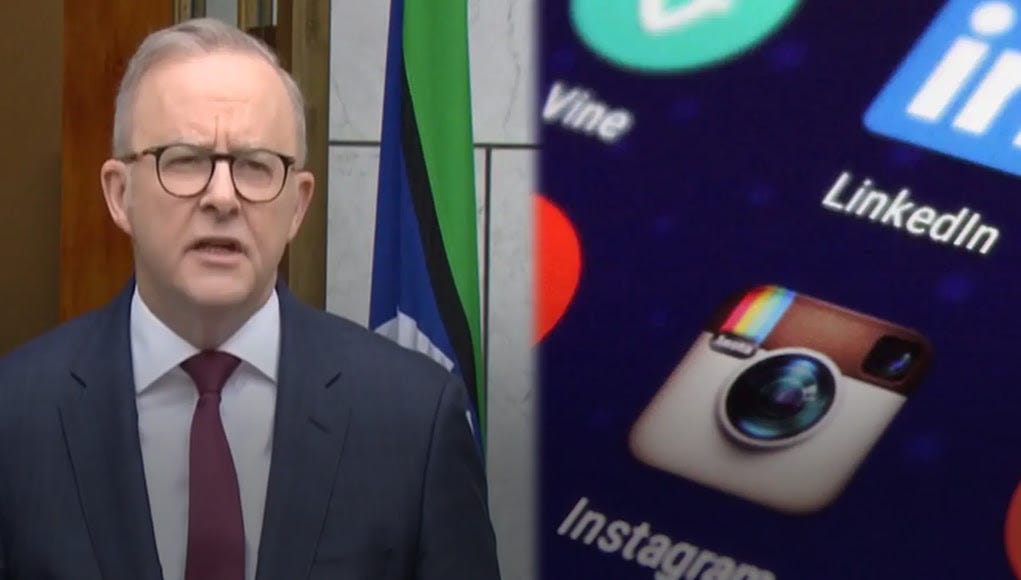
Under-16 Ban – Protecting Kids or Power?
Voters should be wary whenever major parties align too closely. Lockdowns, vaccine mandates, mandatory data retention, ‘anti-terror’ surveillance laws, gun buybacks, and the wars in Iraq and Afghanistan – history shows that when Labor and Liberal unite, Australians lose civil liberties. So, when Anthony Albanese and Peter Dutton backed a social media ban for under-16s, alarm bells rang.
Whenever a government encroaches on freedom, it usually appeals to safety and concern for the vulnerable. The language is always about protecting children or the public from some external threat. In 2021 it was COVID-19; in 2011, terror networks; in 2003, WMDs; in 1996, semi-automatic rifles. Now, in 2024, it’s ‘misinformation’ and ‘social media.’ Once again, the government steps in to ‘protect’ children from an online bogeyman.
The U16 Social Media Ban will do little to shield young people from the real dangers online. Instead, it will erode parental rights, stripping parents of their ability to make choices for their own children. Enforcement will be difficult, if not impossible, and the costs will ultimately fall to consumers, either through taxes or platform fees. The law will fail in every goal the government claims to pursue.
Where is the respect for parents in Labor and Liberal’s agenda?
The notion that parents know best about raising their children
has been dismissed by major parties.
What it will achieve is the erosion of online anonymity and a tighter grip on free expression through social media. Rather than protect children, it will control adults.
The law’s premise is straightforward: social media is seen as too dangerous for under-16s, and parents aren’t positioned to safeguard their kids alone. The government will mandate Big Tech to block users under 16, placing full responsibility on social media companies without penalising non-complying minors or parents. Platforms that fail to comply face heavy fines and legal battles, forced into more complex service standards without demand from users.
Where does this urge to protect youth from social media come from? It’s hard to see why platforms like Facebook, Instagram, and X are deemed riskier for young people than the vast explicit, violent, and illegal content elsewhere online. Even if social media is somewhat harmful to young people, any rational view would surely place unrestricted access to pornography sites – with minimal age checks – as a greater concern.
Where is the respect for parents in Labor and Liberal’s agenda? The notion that parents know best about raising their children has been dismissed by major parties. There’s a growing political disregard for Australian parents, to the point where parental authority is barely acknowledged. On social media, the government decides when exposure is ‘appropriate.’ Paired with policies that sideline parents of children questioning gender, it sets a troubling trend for parental rights in Australia.
Whenever a government encroaches on freedom,
it usually appeals to safety and concern for the vulnerable.
Is this law even enforceable? Not without hefty costs, added complexity, and major changes to how Australians access social media. The only effective way to enforce age checks will require government-issued ID (which the legislation prohibits) or credit card verification for account holders. These mechanisms are costly and will likely pass costs to Australians, either as users or through Australian advertisers. They could also bar 16- and 17-year-olds, who are legally allowed on these platforms.
So, if protecting children from actual online risks isn’t the priority, what is? Liberal and Labor’s fixation on ‘misinformation’ – a euphemism for narratives they oppose – has become pervasive at all levels of government. It’s the explanation behind vaccine hesitancy, the Voice referendum outcome, and now the U.S. re-election of Trump. Thankfully the Misinformation and Disinformation (MAD) Bill, another restriction on free speech, has been dropped for now. Requiring social media companies to verify users’ identities – thereby erasing anonymity – serves political aims of curbing narratives that challenge power.
To exclude under-16s, social media companies will need to identify all Australian users, likely through a Digital ID or at least by storing information that is then accessible by court order. This may sound speculative, but given current trends, it’s plausible. There is also precedent for it – in 1985 the government proposed the Australia Card, a national identification card that was abandoned in 1987 amid strong community opposition.
The fear of opposition and community backlash is the reason Dutton insisted on the legislation passing this year. It is the reason the bill was rammed through the Senate alongside 30 other bills. It is why debate on the bill was limited to one hour. The Labor and Liberal ‘Uniparty’ did not want proper scrutiny of this legislation, because they knew Australians would reject it if properly informed. Not because Australians are unconcerned about social media, but because they reject the idea Government is better placed to address those concerns than parents.
The bill passed into law in the last sitting week and except for a couple of Coalition members crossing the floor, it had bipartisan support. This should give libertarian minded members of the Liberal Party pause for thought. It should cause all libertarians to consider the conversations they will have at Christmas this year, and how they will prompt friends and family to consider how much Government they want in their lives. Next year, their vote can send a message.








